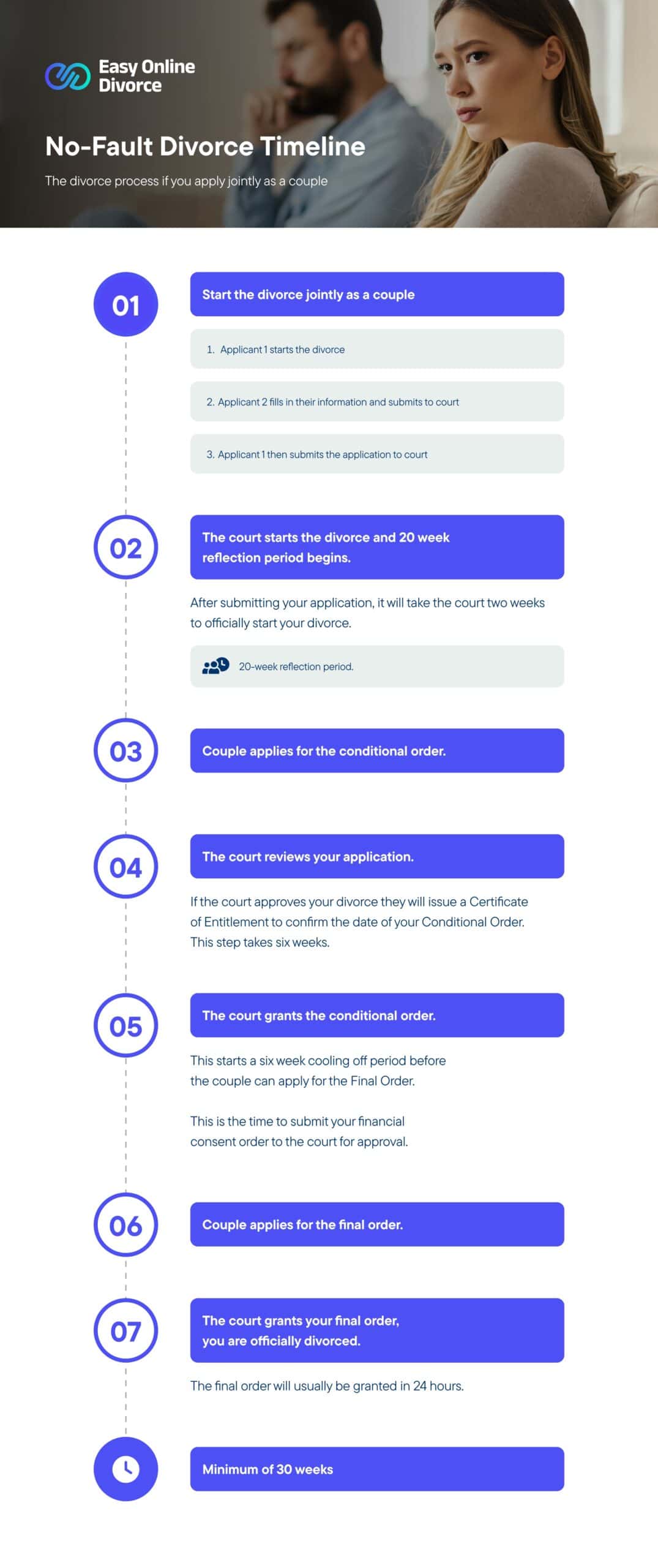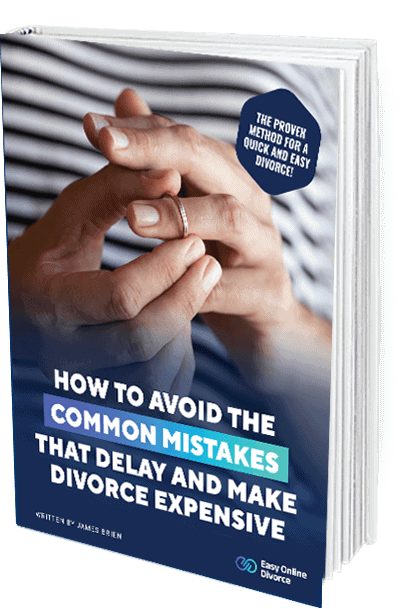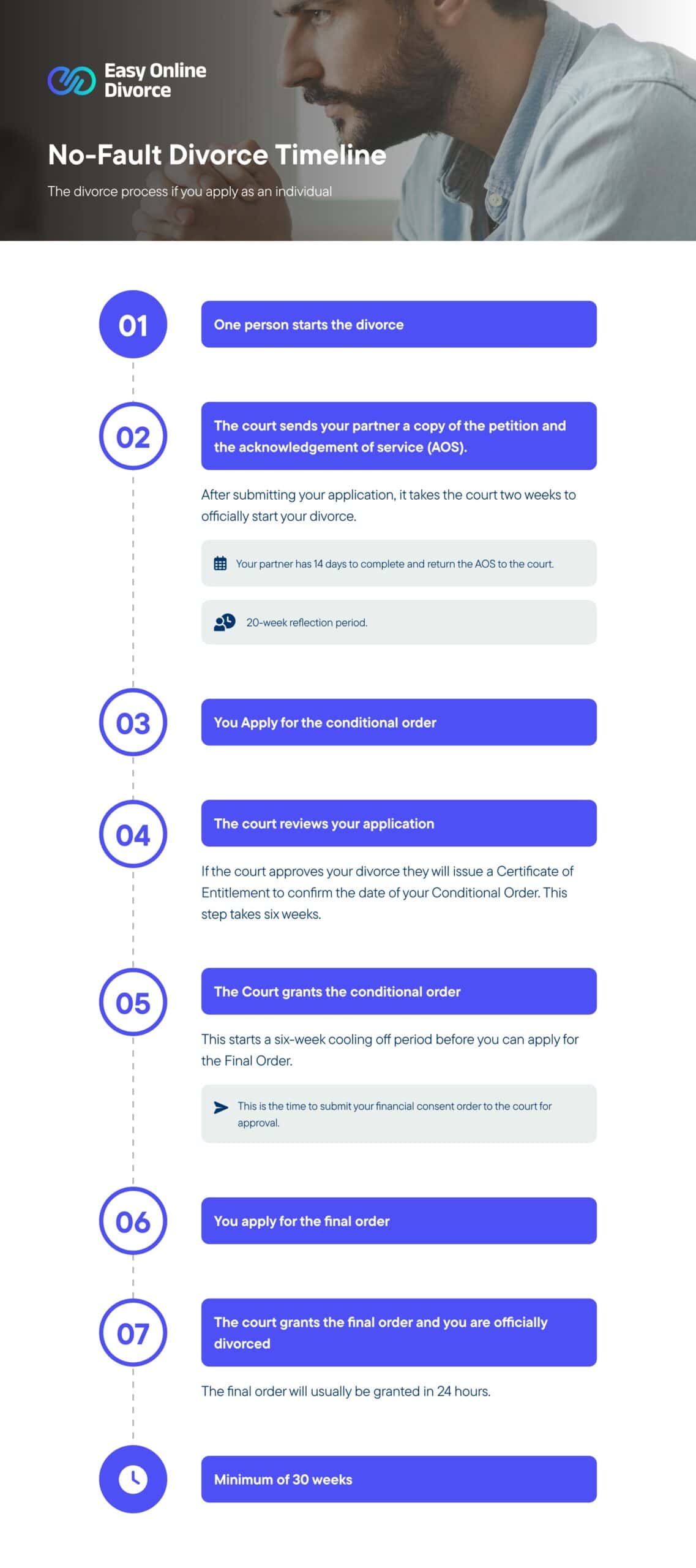Deciding to divorce your spouse is difficult. And now that you have decided to divorce, you seem to face an endless list of questions and have decisions to make that can carry long-lasting consequences.
This is made more challenging because divorce’s emotional burden can cloud our judgement. On top of this, the legal profession, which we often rely on, insists on keeping the divorce process shrouded by often baffling legal jargon.
However, with the arrival of online divorce services like Easy Online Divorce, there are options available that allow couples to part amicably and affordably, leaving their post-divorce relationship and finances intact.
This short guide will give you all the information you need to get started and the options available to you. It will walk you through the steps you need to take to get a divorce in the quickest, easiest and lowest cost way possible.
The three elements of divorce in the UK
There are three elements to consider when divorcing:
1. The formal ending of the marriage or civil partnership
These are the legal steps you take to end your marriage. It includes filing a divorce petition and applying to the court for conditional and final orders.
2. Financial agreements and settlements
This is how you will divide your assets, debts and pensions and decide where you will both live. A Consent Order makes your agreement legally binding by the court. Even if you don’t have assets to split, you should consider Clean Break Order which protects you both from future financial claims from the other.
3. Your childcare arrangements
If you have children, you need to agree on how you will co-parent them. We recommend that you arrange this informally with your spouse because formalising this step through the courts is costly and highly disruptive. A good way of agreeing on arrangements is through a parenting plan.
Can I get a divorce in the UK?
You can divorce in England or Wales if all of the following are true:
- You’ve been married for over a year
- Your relationship has permanently broken down
- Your marriage is legally recognised in the UK (including same-sex marriage)
- The UK is your permanent home or the permanent home of your husband or wife
How to divorce as an individual
The new no-fault divorce law that replaces the old fault-based system came into effect on 6th April. Under the new law, anyone applying for a divorce or an end to their civil partnership can apply jointly or individually. This section will walk you through the process as an individual (sole applicant) filing for divorce.
A divorce application made by one applicant is known as a sole application. In a sole application, the person applying is known as the applicant, and their spouse/civil partner is known as the respondent.
Sole applicants will not be able to change their application to a joint application, so your decision on whether to apply solely or jointly must be made at the start.
How long does a no-fault divorce take in the UK?
The new no-fault divorce will take a minimum of seven months compared to the old process, which could be finalised in three months. The longer time frame is due to a new mandatory 20-week ‘reflection period’ between the start of proceedings (when the court issues the application) and when the applicant can apply for a conditional order.
There is another six-week window between the court granting the conditional order and when the order can be made final. The complete process, along with timescales, can be seen in the infographic below.
How to file a joint divorce application
For the first time, couples can make a joint application under the new no-fault divorce law that came into effect on 6th April. Both parties can apply for their divorce or dissolution together and be equally responsible for the application. They are known as Applicant 1 and Applicant 2, rather than Applicant and Respondent as in sole (individual) applications. This section will walk you through the process as a couple (joint application) filing for divorce.
Unlike sole applicants, joint applicants can switch to an individual application if their relationship deteriorates or when one party is not taking the necessary action to progress the application.
How long will a no-fault joint application divorce take?
A joint application takes the same time as the sole application, a minimum of seven months.
The complete process, along with timescales, can be seen in the infographic below.

What grounds do I need to use for a no-fault divorce?
Under the old divorce law, you had to support a divorce application by one of five facts – adultery, unreasonable behaviour, desertion, two years’ separation, or five years of separation. The new no-fault divorce removes the need to provide evidence of conduct or separation and replaces it with a simple requirement to give a statement that the marriage or civil partnership has ‘irretrievably broken down.
Can my ex contest a no-fault divorce?
One of the most significant changes in the new no-fault divorce laws is removing the ability of the respondent to defend the decision to divorce or end the civil partnership.
Respondents are not able to dispute whether the marriage has broken down. They can only dispute the application in the following limited circumstances:
- If the court doesn’t have jurisdiction to conduct the proceedings. For example, if neither of you have a permanent home in England and Wales.
- The marriage or civil partnership isn’t legally recognised in the UK – some religious marriage ceremonies are not recognised in English law unless specific legal requirements are also met.
- The civil partnership or marriage has already been legally ended in proceedings outside England and Wales.
How much does it cost to get a divorce?

The service you use to get a divorce has a significant impact on the overall cost of your divorce. You have three choices:
- Manage your divorce yourself (DIY)
- Use online divorce services like Easy Online Divorce
- Hire the services of a traditional high street solicitor
Cost of Divorce – Court Fees
Regardless of how you decide to deal with your divorce, there are mandatory court fees to pay that are currently £593. This doesn’t mean you have to attend court. These are the fees to pay for the court’s staff to process your divorce. This means that even if you decide to handle your entire divorce process yourself, you will still be required to pay the court fee unless you are eligible for the ‘help with fees’ scheme. You can apply for help with fees if you receive certain benefits or earn a low income.
You can find more details about help with fees in our free guidebook available at the bottom of this article.
Cost of Divorce – Do It Yourself (DIY) Divorce
Doing it yourself is the cheapest way to get a divorce. You can apply directly on the government website for your divorce online or by post. A word of warning, though. You will need to take the time to research the procedure and learn the legal jargon to ensure that you don’t make any mistakes. Mistakes result in delays and can incur court charges of £95 to correct applications.
If you put aside the time and have good attention to detail, this is your cheapest option. The cost of filing for divorce is zero. The only cost would be the £593 court fees unless you are eligible for help with fees.
Cost of Divorce – Online Divorce Services
If you don’t have the time or willingness to go down the DIY route, the next lowest cost option is to use an online divorce service like Easy Online Divorce.
One of the biggest worries about divorce is how much it will cost.
We offer transparent fixed-price services for uncontested divorces without hidden nasties, so from the start, you’ll know exactly how much your divorce will cost you.
The next worry is the uncertainty and discomfort you can experience going through a divorce.
Solicitors aren’t known for their warm sparkling personalities, and they are expensive, so we use ours when we need to and let our legal advisors, who excel at customer care, support you. Not only do you get a more caring and friendly divorce experience, it’s also more cost-effective.
Our individual Managed Divorce Service costs £249. Here we draft and file all divorce documents with the courts and manage your divorce through the court for you.
We also have a Couples Managed Divorce Service where we work with both of you to achieve the most amicable divorce, which is £489.
We love and value everyone on our team – even our solicitors! But I like to say that we think like lawyers but don’t act like them. You get all our legal expertise and support without the exorbitant price tag. And all in a much more personable and human way.
Online divorce services are much quicker because our central aim is for our clients to divorce amicably and avoid unnecessary conflict that causes delays.
In contrast, solicitors charge by the hour and make significant money from conflicts between divorcing couples.
Summary of costs – Easy Online Divorce:
Individual Managed Divorce service costs: £249 + £593 in court fees = £842.
Couples Managed Divorce service costs: £489 + £593 in court fees = £1082.
Cost of Divorce – High Street Solicitors
You should use a solicitor if your divorce is contested or highly complicated. Examples of this would be situations where you cannot, under any circumstances, reach an agreement on your divorce, the division of assets or the care of your children.
Some fixed-price packages are available, usually starting at around £750 + VAT, but this is only for uncontested divorces where you are better off using more cost-effective online divorce services.
Most often, you will be quoted £1000+ even for the most straightforward divorce because most solicitors charge hourly rates.
A partner or legal director of a large firm charges over £400 per hour. Even a trainee bills more than £100 per hour.
This is where divorce costs start to spiral out of control – especially when complex negotiation between the parties is required. If a couple cannot agree by themselves, they must go to court for a judge to decide for them. Then the costs run into the thousands, just for a single court hearing.
Summary of costs – High Street Solicitors:
The lowest end of the scale: £900 + £593 court fees = £1493.
Average cost: £2000 + £593 =£2593.
With court appearance (resolved quickly): £10,000 – £15,000
Fully contested hearing in court: £25,000 to £40,000.
How to Avoid the Common Mistakes that Delay and Make Divorce Expensive
I hope this article has given you a good understanding of how you can get a divorce. You can find more details, including a step-by-step walkthrough of the divorce process, in our free ebook, How to Avoid the Common Mistakes that Delay and Make Divorce Expensive.

This short but powerful book also contains handy divorce checklists, frequently asked questions, more information on financial settlements and childcare arrangements, and our top tips on making your divorce as low-cost and stress-free as possible.
Click here and enter your details below, and you’ll instantly receive a copy of your book by email.
Next steps if you are ready to start your divorce
Are you ready to start your divorce? If you want to get started, all you need to do is decide if you want to file as an individual or as a couple. Our individual-managed divorce service is £249, and our couples service is £489. Just click the button below to get started.
What happens after I order the service?
We aim to make the divorce process as easy as possible. Once you have ordered a service, you will receive an email with a link to an online questionnaire. Complete the questionnaire (it shouldn’t take longer than 5 minutes) and email us a photo of your marriage certificate. That’s all you have to do.
We will prepare your divorce application, submit it to the court and then manage your divorce through the courts for you.
You won’t have to waste time on the phone with the courts or having to chase up a solicitor for an update. We automatically give you updates as we progress through the process, saving you time and stress.
Still not sure what to do?
You can book a free consultation with one of our friendly experts by clicking on the button below.



